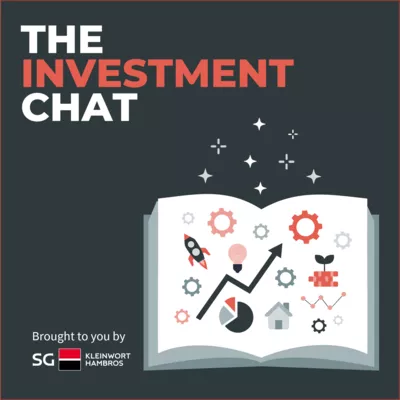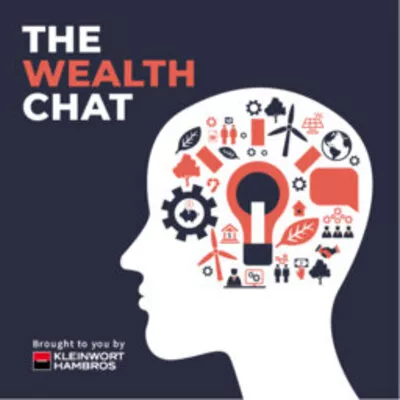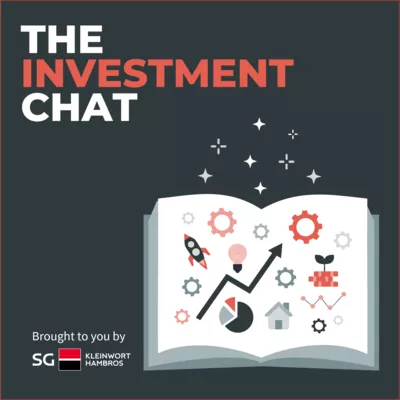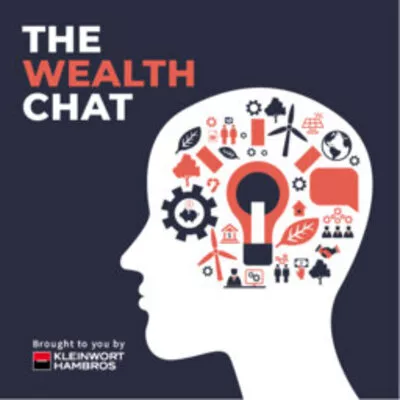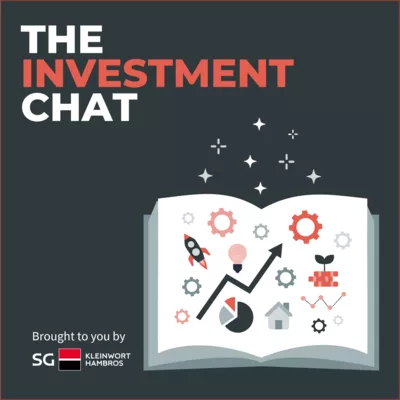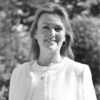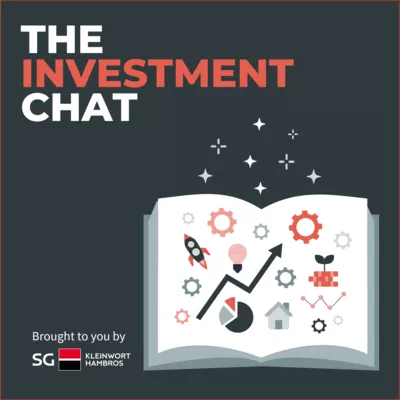
BUILDING SUCCESS THROUGH TO MATURITY, with Childs Farm
Transcript
The Entrepreneurs Chat
Ep 4 - Child’s Farm
James Hurley: Hello and welcome to The Entrepreneurs' Chat, a podcast brought to you by SG Kleinwort Hambros. I'm your host for this series, James Hurley, Assistant Business Editor at the Times. From startup to sale and everything in between, building a business is never plain sailing. In this series, we go behind the scenes reflecting on some of the highs and lows that come with growing a business. Today, I'm joined by Joanna Jensen, Founder of Childs Farm, a leading child and baby skincare brand.
Joanna Jensen: When you're in that situation and you've run out of cash, don't sit there and think, " I'm not going to say anything because I'll put off my existing investors." Go out there. There are angel investors who specifically invest in distressed businesses, and I went straight to a broker who did this. I went straight to him and I said, " Help."
James Hurley: Joanna started making her own skincare formulas back in 2010 to help soothe the skin of her youngest daughter, Bella, who had eczema. Last year, she sold 90% of the resulting company, Childs Farm, to PZ Cussons for 36. 8 million pounds. The 12- year journey in between has been, to use Joanna's own word, madness. Over to Joanna to tell us all about it.
You built one of the UK's leading child and baby skincare businesses despite having no experience in the relevant areas. I'm thinking things like consumer goods, branding, packaging, retail, even chemistry. Take me back to the beginning and explain how it all began.
Joanna Jensen: Well, I mean, it's like a lot of these things. You have a situation in your life and you want to resolve it, and there was nothing that could help me resolve it. I was an eczema sufferer as a child. When my youngest was born in 2008 with atopic eczema, I was shocked to discover that nothing had improved in terms of our skincare availability, certainly for little ones. It really was the fact that there was nothing there and I needed something desperately for her. And if I needed something desperately for her, there were other people that needed it desperately for their children.
It was a sort of very much needs must with absolutely no experience, as you point out, in any of this area, other than an absolute fascination and a real interest in a natural non- medicinal ointments and treatments. Because as I say, I had eczema as a child and I've always had sensitive skin. I've always been very interested in natural solutions for sensitive skin sufferers.
James Hurley: When you started the company in 2010, had you been harboring a desire to start a business to become an entrepreneur or was it purely because you wanted to solve this problem? I
Joanna Jensen: I mean, the word entrepreneur I find fascinating because actually it's a French one. It means risk- taker. When I was 16, I made a load of products and sold them in my grandfather's antique showroom and went on, had a French polishing business, and indeed in my early 20s had an interior design business. But I think for me, setting up this business was the absolute entrepreneurial thing because of the amount of risk I took, but I had no desire really to set up another business.
I was quite happy doing what I was doing. And having had both my children quite late in life, I just wanted a rest to enjoy them. But circumstances changed. I had this real need because of Bella's skin. Couldn't find what I needed and I thought, damn it, I'm going to do it myself.
James Hurley: We'll talk a little bit about your background in financial services later on. But first of all, can you tell me a little bit about what the early years of Childs Farm were like? As I said, you started the business in 2010, didn't you? I think it took about four years to get into major retailers, to get some listings in the likes of Boots and Waitrose and others. What were you doing in that period? Did it take longer than you expected to get traction, or was it a purposeful building of the company that meant it took a while to get seen in major retailers?
Joanna Jensen: Well, I think any founder knows you have to have patience and resilience in spades when you go about setting up a new business. For me, I mean, I registered the business in 2010 and we spent 2011 working on the formulations, the packaging, and making sure that everything was as it should be. And then went on, started selling online in 2012. We had some early victories, which were Amazon and actually Ocado in 2013. But to get into main retailers, so the big four grocers, Boots, Superdrug, that's a real slog because they have to take a risk too.
Because you're a startup business, you've got to prove that you're going to remain solvent. You can't just deliver some products and then hope you've got enough money to deliver them the following month. Plus, they have their own different terms of business. This is something that really I was completely naive about at the beginning is people don't pay you when they get the goods. Some people's payment terms are something like 90 days, and that's a long time to go without payment for stock that you've sold.
Ironically, the big businesses have 30 day payment terms, but SMEs are really stretched to the wire. It's another one of those I suppose the unfair things about being a small business is that you have to prove yourself before anyone gives you any credit.
James Hurley: How did you go about doing that? How did you prove that you were worthy to work with major retailers and indeed you could smooth out that cashflow and survive and be solvent through that process?
Joanna Jensen: I basically did a deal with my amazing manufacturer, a guy called Tom Allsworth. Ran a business called Medichem. They were contract fillers, contract manufacturers. He basically bankrolled me going into the initial bigger retailers. He totally believed in the brand. He knew we had the listings. The first listings we got in Boots and Waitrose in 2014, I was short of cash and he, bless him, he agreed to help me in the interim, because of course, he knew he was making the product so he could deduct whatever needed to be done. We ran the business initially through his account, which was a godsend.
James Hurley: Have you got any tips on finding a relationship like that or developing it? Because it sounds like you might not have actually been able to get this business to the point it's at now if you hadn't have had that support, because financing cashflow issues with resellers is a huge problem for businesses of all sizes and certainly a lot of small businesses don't survive when that happens. How'd you find and develop a partner that's willing to help you do that?
Joanna Jensen: Well, I mean, just ask a lot of questions, ask other people who've done it, who they've used for contract manufacturer. There are some real gems out there. But like many things, you have to do a lot of sifting to find them. I was very lucky. I was recommended to Tom through a friend of a friend. He understood what I was trying to achieve. He himself is an entrepreneur and he actually set up Revolution Beauty, and he had done a myriad of things as well. He really understood what I was trying to do.
I think it was a privately owned contract manufacturer. I think that was key. I think if it's a big business, you're going to find this a lot more tricky to try and get someone to back you. But everything in business, and this might seem quite bizarre because we live in a world where people do things via email, but relationships, when you are an SME, the relationships that you have with your suppliers, the people that you work with, your retailers are absolutely key. They cannot be nameless and faceless.
Because when you do need someone's help, you need to have a depth of a relationship that can stand that ability for you to go in and ask. I think what frightens me currently is so much is done, and this is sort of part of Covid as well, is not done face- to- face still. And that means that you don't have a depth of relationship that you would do otherwise. Just going out for a cup of coffee with someone, going out for lunch with them, going to their premises, showing that you can make that effort.
I mean, it used to take me two and a half hours to get to Tom. I would go there every single month. Sometimes I'd go there three, four times a month because my relationship and anyone's, if you're an FMCG, anyone's relationship with their supplier, their contract filler is the most important relationship that you have. If you have no products, you can't sell anything.
James Hurley: Great tips there. That's a strong relationship, but not every relationship that you've had in the business has worked, has it, Joanna? Can you tell us a little bit about what happened in 2014 when you thought you'd secured an investor that was going to make a multimillion pound injection into the business and I understand they pulled out at the last minute. Is that right? Can you tell us a little bit about what happened?
Joanna Jensen: Yeah. We were courted by this investor for about six months. There was always this doubt in my mind because we didn't fit their investment criteria, but the principal was absolutely determined that he was going to make this investment. We jumped through all the hoops, lawyers were involved. As you can imagine when you're an SME and you're getting big lawyers involved, that's a lot of expense. We had these listings books in Boots and Waitrose. And four days before we were due to sign, they pulled out.
I have to say, all credit to the other members of the business who I still stay in touch with, who were super, super supportive. The individual themselves was not, and they helped me navigate this real moment of total distress. I can't tell you, as you alluded to earlier, I was just about to leave my home. I'd been going through a divorce, and I had two small children. I had a month to find somewhere to live and also needed to get this investment in. That was one key part of the jigsaw.
When they pulled out, I literally felt like my whole world was crashing down around my ears. Again, this is part of being an entrepreneur, a founder is the first thing I did, I was told on the telephone, I went straight to the train station, got on a train to London, just turned up at their office and I said, " Talk me through this. Talk me through why you've done this." I'm just in total shock. Actually we ended up having a call with Boots and his opening gambit was, " Right. Well, Joanna's got no money, so this business is obviously just about to go bust, but you've got the listing. What do you want to do?"
Talk about kicking someone when they're down. I arranged to go and see them the following week, and I drove the three and a half hours to Boots thinking, I'm buggered, I'm buggered, I'm buggered, but I'm always thinking on my feet. I thought, I'll come up with something. I don't know what, but let's just get a sense of the situation and I'll play it by ear. What I had not considered was that I was going to walk into a room full of senior representatives of Boots who turned around to me and said, " Joanna, we love your brand. We love you. What can we do to help?"
I was absolutely blown away. I mean, how I didn't burst into tears on the spot is beyond me, but I thought, I don't really want to have a retailer investing in my business. I mean, in hindsight you think, what was I thinking and why did I say it? I said, " You are absolutely amazing. It's all in hand. It's all in hand. I've got an investor lined up, but thank you. Everything is business as usual. Don't worry, we'll be there on time." Actually it's because I had spoken to Tom at Medichem and he had said, " Don't worry, I'll look after you."
It was a temporary fix, but it gave me a breathing space to know that I could actually find another investor to help me out. But I mean, talk about one of those heart stopping moments where you actually think you're going to be physically sick. In that circumstance, there wasn't really any logic other than the fact he turned around to me and he said, " You don't fit our investment criteria." You don't go through a process with someone for six months knowing you don't fit the investment criteria.
I've been in investment rounds looking at other businesses and we've pulled out, but we've pulled out because there is something fundamentally wrong with the business and that somebody has told us something that isn't strictly true. Of course, then you're not going to invest on that basis. I mean, my experience out of this was the first question you ask someone who is looking to invest is, do we fit your criteria? What is your expectation from this investment? Understand, question them to make sure that they are going to go the whole way.
If you're sure that your business is sound, you've done all your due diligence, you know that you've paid for all your stock, that you know what your cashflow looks like, and that you are absolutely honest with them about your situation, then you'll find, and then it's just a case of them deciding whether it suits their appetite or not. But if it doesn't suit their investment criteria, just walk away.
James Hurley: Was there a little bit about learning to listen more to your gut instinct as well, Joanna? Because you'd mentioned that you were concerned that you didn't fit their investment criteria and this had been playing on your mind, hadn't it, as this process was going on. After this happened, did you think, well, actually I have got good instincts and maybe I should listen to them more?
Joanna Jensen: Totally. You're absolutely right, James. Because if it doesn't smell right, you're not feeling it in your waters as it were, walk away. Again, I think we need to collectively rely on our gut instinct a lot more. I didn't particularly like the individual. You cannot go into a long- term relationship, and I know that a lot of young entrepreneurs these days think it's a five- year process, it's not.
You're probably looking 10 to 15 years and to have a relationship with someone who you don't actually like for that period of time is going to be immensely stressful and very challenging. I mean, again, if you don't like them, don't do it.
James Hurley: You mentioned that this period coincided with strife in your personal life. You're going through a divorce. I think you also had a health scare around this time, didn't you? I wondered if you could tell us a little bit about that. And then I also just wondered how you managed to keep the show on the road really given that you're trying to manage distress in the business, but then also all sorts of problems in your personal life. What reserves did you draw on to just keep going I suppose?
Joanna Jensen: I think we're all a lot more capable than we think. When we're put on the spot, I think by and large, all of us have got reserves there that we never really tap into because it's easier to get someone else to do it or just throw in the towel. But when you're a mom and you've got two young children who are 100% your responsibility and rely on you from everything, from food to a roof over your head to their clothing, you've got to step up. I was going through a divorce.
My now ex- husband then took me to court, which was just unfathomable considering the house had pretty much been repossessed. We lost our home, and this was all based after the 2008 downturn and he lost his job. It was just a catalog of disaster. I knew I was going to be homeless. I had to find somewhere to live. We lost our investor. Throughout this time, I was feeling really not very well. I was really struggling to eat because I had such pain in my stomach. As it transpired, I had a massive fibroid, which is something that women can be prone to.
I, in fact, was very prone to it within their wombs that mine had grown out of my womb and wrapped itself around my intestines and my appendix. Eventually I was in so much agony. I went to go and see my private GP in London and I said, "I don't know what to do with myself." He rushed me for a scan, and then I was rushed in and I had this two and a half kilo tumor removed and was told, " You probably had about 10 days and it would've burst. Knowing what you're like, you'd have taken two paroxysmal and gone to bed and you'd have never woken up.
Or if I'd had made it to hospital, that had just taken everything out." I mean, I carried on through all of this in quite intense pain actually. But there was some good news amongst all of this period in so much as I found my, as it were, forever investor throughout all of this. I mean, look, I knew I didn't have any money, and I'm not proud. When you're in that situation and you've run out of cash, don't sit there and think, " Oh, I'm not going to say anything because I'll put off my existing investors."
Go out there. There are angel investors who specifically invest in distressed businesses, and I went straight to a broker who did this. I went straight to him and I said, " Help." He put me in touch with this forever investor, Andrew Leek, who was by trade a private equity investor, and he now is now doing private investment himself. We met and I always say he was the younger brother I never had.
He was a highly intelligent, really gifted individual, still is obviously. He and I just gelled immediately. That importance of having an investor that you like, that you want to spend time with, don't underestimate that, but also one that delivered something to the party. Andrew was inflection, really understood about what you needed to take a business and get it ready for private equity or a trade sale, but also was one of those classics. He would roll up his sleeves and got stuck in. I mean, poor sod.
First three months, he ended up coming from Fulham down to Hampshire three times a week. He was in effect our CFO and our COO. I mean, the most he ever really got was a sandwich out of it. I mean, 2014 was an absolutely shocking year, but I learned so much about myself. I learned so much about what people thought about the business and what people thought about our products. I met someone who will be a friend for the rest of my life. I'm always the glass is most definitely not even half full.
It's always full, practically to overflowing. We have a choice. We can either lie down and give up, or we can say, " Stop this." You pick ourselves up, brush ourselves down, and get on with it. And that's my mentality. I will always have a little weep, go to bed, get up in the morning and get up fighting. Two little girls are about the biggest motivation you need to get off your ass and get moving.
James Hurley: You built this without any background in branding, retail, consumer goods, things like that. But what about financial services? You had a successful career in the city before starting the company. Did that come in handy?
Joanna Jensen: I think I was really lucky. Especially now when I see a lot of my female founders, it is understanding about a balance sheet, understanding about P& L. These things are so, so, so important. I didn't have to rely on a third party. I could do it all myself and I could understand it all myself. I think I said to my girls, if you're not sure what you want to do, go and do an accountancy course. Just go and learn how to understand the balance sheet because it's so, so, so important. Saying that, I never had a business plan.
I initially did it on the huff and I had to do a business plan halfway, which is unforgivable for someone having worked in investment banking for as long as I had. But the other thing as well, which no one really talks about, is I'm a lot older than most entrepreneurs. I started this business when I was 40. With age comes wisdom. I don't want to sound like my mother, but it really does. You understand the importance of having a commercial economic enterprise rather than a passion project.
It's getting that balance right, and it always was a commercial enterprise for me. I did this to make some money. What I'm struggling with a bit now is pulling at the heartstrings, the fact that it's no longer mine, but it was a means to an end and it did that. I know that probably sounds really harsh, but that is what years of investment banking taught me. Yes, I'm passionate about it, and yes, I got emotional about it, but probably because I had so much at risk, so much at risk, and I would never recommend to anyone they put as much risk into their business as I did.
James Hurley: It's actually really refreshing to hear people talk in that way, Joanna, as you say about the facts that actually money is an important motivator and you do want to make money out of the business having put so much effort into it. A lot of people seem to be shy about talking about that. I've never quite been sure why, but that's right.
Joanna Jensen: I think what we're going to see sadly over the course of the next year is a lot of people, I mean, who've got some brilliant products are going to struggle, who are really, really going to struggle, and that is simply because the economic environment that we find ourselves in, but good products, good brands will will out. They will keep going. My advice to anyone who is struggling a bit is to just look at every penny that you're spending, and that one quick round circle is, what's my return on investment?
Am I getting one? If I'm not, why am I doing it? Don't whatever you do start doing NPD right now. This is not the time. I actually spoke to someone the other day who's just invested a huge amount of money in NPD and I said, " That's fantastic. Who are you distributing it through?" They said, " Oh, no one. No one's taken it." I just said, " Stop it right now because you're tying up cash in stock that has no home." Now's the time to really take stock literally. What am I spending my money on?
How long is it going to sit then? The best piece of advice my grandparents ever gave me was turnover, turnover, turnover, and that's what it's all about for the next 12 to 24 months.
James Hurley: When you've got your new investor in, what tangible differences... I mean, it's a bit more than an investor maybe, really a business partner and, as you said, friend. What tangible differences did that make to the business that then put you on the path, that, of course, led to a successful trade sale a few years later on? What tangible differences and changes were made to the company that set it on this growth trajectory?
Joanna Jensen: I mean, being a CEO and being founder is a really lonely space because you can't talk to your employees about what's really going on. Well, you can and you can't, but you don't want to frighten people and you also want to attract the best talent that you can. The last thing that they want to hear is that you're down to your last 50 P. Not only did Andrew and through his network bring in some other investors as well, so he brought in capital, but he also brought in this real sense around...
I mean, I'm a huge risk- taker. I will seat of your pants kind of gal and Andrew wasn't. We had balance. Actually one of his other investors, Paul Cartmell, who's a god of marketing, also came in and the three of us basically ran that business together, and we had balance. I was one end, Andrew was the other, and literally Paul was slapped bang in the middle, but with this brilliantly experienced marketer. It brought structure. Just the simple fact of having a board meeting once a month meant that you were having to report on your activity.
You were having to look at what you were spending your money on. You were having to ask, if we're going to spend this in marketing, what's our return on investment? Making people think, actually, do you know what? I could spend 10 grand and I could get nothing back. Actually, I'm not going to do it. But it brought structure, it brought debate, and it brought camaraderie. We were all in it together, and I desperately needed that, because I'd felt like I was on my own and I was battling all these battles on my own. And I was knackers.
James Hurley: You mentioned marketing there and obviously you've built a very successful brand, a very successful children's skincare brand. For anyone listening who's trying to build a consumer brand business, what tips have you got? What have learned about doing that?
Joanna Jensen: Oh wow. Look, looking at the market as it is now, which is so digitally driven, and how all these operators, be that social media, be that Google, are asking for an awful lot of money and you're never really sure what you're going to get out of it. We launched in a market which was billboards and print magazines, and it was very different. It was advertising in its truest, oldest style. As we launched the products really...
And not forgetting, I'm just going to go back a stage, not forgetting the transit van moments that I had, trucking around all of the country, going to school fairs, country shows, trade shows, consumer shows. I mean, literally me and my transit van were the best friends, because what was so important for me was my consumer. At the heart of everything we did was our consumer. How can I make her life better as I made my own life better by actually having a product that helped my daughter's poorly skin?
Telling that message is much more compelling if it comes from another mom, dad, parent, whoever, who says, " Yeah, this stuff really works." For any product that anyone is creating, it is so much more compelling if someone does your storytelling for you because they have no acts to grind. They're not on the payroll.
I felt that for babies and children's skin and poorly skin, this is something that is... You cannot get this wrong and you've got to have people telling those compelling stories. We did TV as well, and I would say to anyone out there, don't underestimate the value of TV and radio. I think it does make a profound difference to what you're doing. But the thing for us was brand in hand and we did sampling like you wouldn't believe, little bottles. We were giving them away to people who signed, who went to the NCT, nearly new sales to baby shows.
I mean, I'd have a box of them in the back of my car. I remember driving past the pond in Bond and I saw a woman with three little children. I stopped the car and I said, " Oh, hi. You don't know me. I'm a total stranger, but I've just seen you've got some little ones. I wondered if I could just give you some of these products." It was that kind of behavior, which again, if you read a textbook on marketing, it will tell you statistically how to do it. I just think if you want to reach your consumer, you need to know your consumer.
You need to spend as much time with your consumer as possible. When you're working for an SME or you're setting up a new business and you are really striving to reach that consumer, talk to them and understand what their touchpoints are. Don't do a theoretical approach at it. If you look at any successful FMCG businesses, because they've done something different, they've been disruptive. I mean look at BrewDog. Look what they do. You may not agree with what they're saying, but boy, they can get some headlines. I would say to any marketer out there, push yourself. Push yourself. Go and talk. Go and sit in wherever you sell your products or products that are like it if you're fairly new to some listings. Go and talk. We'd go and talk to people who were shopping in Boots.
I mean, why we didn't have restraining orders taken out on us is beyond me. But you'd go up to someone and they'd be in the baby aisle and they'd be looking at everything. You'd introduce yourself and you'd say, " Look, I'm really sorry, but I want to understand why you've made that choice." Nine times out of 10 they'll sit and have a chat with you.
James Hurley: How do you do that at scale though? Because obviously when you come to the point where sold the majority of the business, you were selling millions and millions of bottles every year. How do you keep in touch with your end customer once the business has become something quite substantial?
Joanna Jensen: I mean, that's not for me to say now because all the operational side that PZ Cussons operate with Childs Farm I have no involvement with at all. They are going back to our basics. They are saying, " Right. How are we going to do this?" It's really interesting. They're looking backwards to go forward, and I think that's fantastic. I think that's fantastic. I mean, look, they've got huge amounts of experience that we never had. We were doing everything seat of your pants nine times out of 10, and these guys have been doing it.
Man and boy, they know what they're doing and they know how to get the word out there. But they are what I would say, and I'm really impressed by it, they're taking a holistic view. They are looking at what we've done in the past that's been successful. They're looking at what they do for other brands. I have to say, that's what you want when you sell your business still with a stake in it. Someone who's not going to be, this is the way we do it, so there.
It's time to go back to basics and it's time to look at all of those alternative ways of reaching your consumer. I spend a lot of time working with female founded brands at the moment.
Don't feel that digital is the only way because it's not. It really isn't. There are other ways to get it. But I think I look at the way we grew our business is we built some really solid foundations and we kept on building on that. We got that message around the UK really clearly through our brand ambassadors. See, we had a group of moms, dads, and caregivers who were absolutely dotty about the brand because their own experience had been like mine. Oh my God, my child who's had eczema for however many years, I mean, their skin is fantastic.
They are not crying. They are not complaining. We've made a manifold difference. Plus we had adults who were using the product too, who had phenomenal experiences with it. We had that part of it. But when I go back to talking about these stories, your consumer says for you. We had two points in the lifestyle of this brand. One in 2016. One in 2017. 2016 and Paige Sweeney, her little girl, she just showed a picture of her hands, one before using Childs Farm and one two weeks later.
They went from red, raw and angry to perfect in two weeks. That Facebook post, before Facebook had monetized it, was shared 35, 000 times in the first month. Again, when lovely Laura Gray shared her post, she just showed a photograph of our baby moisturizer saying, " My mother bought me this and it cured my psoriasis in 24 hours." That was shared 65, 000 times. We sold one and a half million quids worth of baby moisturizer in a week. Bearing in mind, it was four pounds. That's a lot of baby moisturizer.
We were the right place for digital then. To do that now, you would have to spend an absolute fortune and it wouldn't have the authenticity. I mean, we didn't even know what was going on. Suddenly our shop went mad. We were having to sit there saying, " Well, what's going on?" It was a lot of head scratching and a lot of confusion and a lot of ignorance, but we got there in the end. God, it was exciting. I mean, really, really, really exciting. And that's why you do this, those moments of madness.
I would love to say it was organized chaos, it wasn't. It was total chaos. Again, our contract manufacturer played a bloody blinder. They were there all night. They were open at weekends. They were there to support us, which is that important to that relationship is so key. If it hadn't been for them, we wouldn't have been able to monetize it the way that we did. But Tom rallied the troops and they were all as excited as we were. All of our componentry supplier were excited as we were.
One wasn't. They were no longer our componentry supplier six months later. Because they just said, " Oh, we can help you in about six months time. We're really busy." But everyone else was just going, " Oh my God, this is so exciting." It was just like a wave that we all ran around holding hands, high- fiving each other as we worked probably 22 hours a day for about three months.
James Hurley: Given the obvious enjoyment you got from building the business, which is coming across very clearly, can you talk me through why you decided to sell the majority of it last year?
Joanna Jensen: Oh, good question. Look, I've got two young girls. They're now teenagers. They're 14 and nearly 17. As your children get older, they need you an awful lot more. Sadly, my mom's got dementia and Alzheimer's. We'd always said to my shareholders, we were aiming to sell around 2020. And of course, COVID hit. COVID was exhausting I think for absolutely everyone, as we all know on so many different levels. I knew that I had to make a change. We also wanted to grow the brand, and we felt we collectively didn't have that level of skillset.
We needed a partner who could help us grow internationally, particularly the US. But also we hadn't really done much in Europe, which was very lucky when Brexit happened. But we had done Australia and running Australia from here was a nightmare because of the different time zones. There was huge opportunities for Childs Farm. We knew there was. We do sell it all over the world anyhow, but we just felt we needed experience and know- how to get us to that next stage. Actually, we were looking for private equity investment to take us there, and I brought in Will Bowler as my CEO.
He had done Popchips prior to that. The plan was he was then going to grow the business and get a team to build it with private equity investment. But out of left field came PZ Cussons. I know it sounds really cheesy, but literally that first meeting we all fell in love and it suited their strategy so well because they wanted to grow in baby and child really badly. They've got a great business in Indonesia, which is baby, and they wanted to do more in the UK and Europe. All the stars aligned.
All the stars aligned. It worked for me. It worked for some of my teams. Some of them had been there slogging their hearts out for... I mean, my head of sales had been there for six years and he literally had never been on holiday. My investors, I had 26 investors, and they were looking to get their money out. It really worked. I think we found a fantastic partner in PZ Cussons.
I'm still there for another two and a half years, not on the operational side, but helping and advising where it's required and also helping to promote female entrepreneurism as well, which is so underfunded in this country as you know.
James Hurley: Did you have any concerns about selling to an established fast moving consumer goods business, given it feels like Childs Farm has very much had the feel of a challenger brand in terms of the contents of what it's made from right down to where the goods are sourced from and everything, it's all about quality, trust, provenance, all those kinds of things? Sometimes things that people don't associate with larger businesses. Did you have any concerns about, I guess, diluting the quality of the brand by selling to a large established business in your space rather than private equity?
Joanna Jensen: I mean, there's no two ways about it. Look, Childs Farm is, it's an extension of me. It is all of my values and principles when it comes to natural origin ingredients, around sustainability. Our plastic is sourced from Indonesia, which is ocean prevented plastic. It creates a social economic environment for them, but it also makes sure that this plastic is reused. We've been ahead of the game in that category of our competitors for years. And also we're a B corp.
But part of the appeal of PZ Cussons and only PZ Cussons, and actually we did have other trade interested, the appeal was they take their sustainability incredibly seriously. Their global sustainability officer, another Joanna, totally understands what she's trying to achieve for that business. They have aspirations to become a B corp themselves. They totally understood what they wanted to do, and they were so honest and not proud. I mean, there was an arrogance by big business as you know.
They were really honest, and they were saying, " We want to learn from you." Because yeah, it's easier for us to do it because our volumes are nothing compared to some of theirs, but they want to learn how we did it and see what we did that they can use for themselves. We struck gold with PZ Cussons, actually. I don't think there is another big organization like that that would've had that sustainability element, which was so super key to me.
James Hurley: What's next for you then, Joanna? You mentioned you're on an earnout for about two and a half years, and it sounds like you're already busy working with other female entrepreneurs. What's the plan for you? What's your next big ambition?
Joanna Jensen: Well, I mean, just right now I'm doing what's required of me by Peter, which is great. I am working with a wonderful organization called BWB, which is Buy Women Built, this was set up by Sahar Hashemi and Bonnie McCowley, about raising awareness of female founded brands who are wholly underinvested in. I mean, if we had as much investment as male founded brands, it's another 250 billion to the economy.
I'm working with this great group of consumer brands, all female founded, which is allowing me to A, mentor some of them, B, give them all of those shortcuts that I never had, but also allowing me to invest in other female founded brands, which I'm really, really enjoying, because this is something that I'm loving doing. I'm also supporting a couple of charities which I adore. We always have writing for the disabled and Paralympics. I am thinking that maybe I need to write a book about my top tips and experiences from FMCG because I think...
Again, I kind of say it how it is. I don't sugar coat things. It was bloody hard. I wasn't the easiest person to work for, but there are reasons for that. I think most founders would agree that those are sort of similar things. I most definitely did this for the money. I had two small children that I had to look after and I bet everything I had on this. I've been told hat, why do I need the money? I've got so many clams in my mouth and all the rest of it. Never judge a book. The world is a garden in which many different flowers grow, and we're all so different.
As you said earlier, nobody knows anyone's backstory. Nobody really knows what's going on. There's all of that that I want to vomit with some structure onto a few pages. Hopefully that helps other people. Really I think the new life for me when I am free is going to be all around investment and being an NED in some of these organizations, SMEs. Because I think the more that those have one in that space can help others will go a long way to filling that economic gap. The British have always been a nation of entrepreneurs.
In spite of COVID and in spite of Brexit and in spite of an economic downturn, we need to keep going. We need to not allow ourselves to lose this brilliance that we have as a nation. I mean, there is still at the moment as well with everything post- COVID, people are a bit down on the mouth. I know so many businesses are struggling to hire the right people, people who've got energy, people who've got desire, people who've got get up and go. We need to make sure that that happens.
People like myself and other entrepreneurs who you've had on this program, this is our giving back. We go out and we make sure this happens, whether it happens in the UK or whether it happens internationally. But my focus is female founders in the UK and I want them to flourish and fly. I'll do anything in my power to make that so.
James Hurley: Well, it sounds like there's more than enough there to keep you very busy. But one final question, would you ever start your own business again?
Joanna Jensen: Oh, never say never, but right now I'm loving spending more time with my kids. Mom needs me desperately at the moment. Not forgetting my boyfriend.
He'll get crossed if I don't mention him. I don't know. Mimi and I, who's my eldest, we talk about it a lot. She's going to do something, and I think we'll probably do something together. That's my hope. That's my real hope. I think it would be extremely argumentative, but I think it'd be an awful lot of fun too.
James Hurley: Excellent. Thank you so much, Joanna. Thanks for being so frank. I really enjoyed the conversation.
Joanna Jensen: Well, thank you, James, and really enjoyed being on it.
James Hurley: Joanna, thanks so much for your time and for being part of such an honest conversation. Some really fascinating food for thought there for entrepreneurs of all stripes, I thought. Next time I'll be chatting to an entrepreneur of a very different sort and a very different industry. Samir Desai, founder and chief executive of Super Payments.
Samir Desai: There were businesses like Square and PayPal, and they were starting to encroach on the loans business that we had. I was trying to work out why they were making so much money. I had this assumption that money was free. I thought when you pay someone in a shop 10 pounds, 20 pounds, that's what someone gets. And then I just started going into it and looking at how the money moved and where it all went, but it just felt crazy to me. It just didn't make sense, and it just blew my mind that there's trillions of dollars of market cap in payments.
James Hurley: Just click the follow button wherever you listen to this right now to be notified when that and all future episodes are available. Until next time, goodbye.
Voiceover: Does running a business leave little time for managing your personal financial affairs? At Kleinwort Hambros, we know how to simplify life's financial challenges for entrepreneurs. Considering your personal and business ambitions, we partner with you at every stage of your life, taking care of your finances so you can focus on what matters most to you. Find out more about how we can help create a secure financial future for you and your family at KleinwortHambros. com.
Ask us your questions
Contact usLatest podcasts
